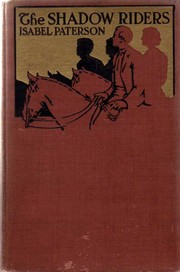· Editor’s Comments
· Find Out More
· Locate a Copy
Editor’s Comments

When H. L. Mencken reviewed Isabel Paterson’s first novel, The Shadow Riders, he concluded that despite “a certain readableness”, it would soon be “dead and forgotten.” And so it has remained, along with all the rest of Paterson’s novels, even with her rediscovery as a Libertarian icon. Frankly, in comparison to her masterpiece, Never Ask the End or even The Golden Vanity, The Shadow Riders is easy for anyone but a completist to neglect.
Yet despite its limitations–wooden characters and sometimes even stiffer prose–The Shadow Riders has a few rewards for the reader who pulls it off the shelf every decade or so.
Paterson’s wit, for one. The book’s epigraph deserves a place alongside any of Dorothy Parker’s best quips:
There is an old proverb which says that one can catch more flies with honey than with vinegar. It is doubtless a true saying; I only wonder what one does with the flies after having caught them.
Lesley Johns, who wins the prize of protagonist after a neck-and-neck race with several characters through much of the book, is clearly Paterson’s avatar. Raised on farm by a long-suffering mother and ne’er-do-well father, Lesley works her way up from clerk to journalist at one of the local papers in the fictional version of Calgary, Alberta, where the novel takes place. Like Paterson, Lesley is clear-eyed about social hypocrites and always keeps a pin handy for bursting bubbles:
“Mrs. McConach this afternoon was almost in tears of ecstasy because the Duke of Inverarie is buying an estate somewhere hereabouts. Her grandfather was a crofter, turned out to make more room for deer on the Duke’s grandfather’s Scotch estate…. [B]ut then the Duke’s great-grandfather’s grandfather was simply the most successful cattle thief on the border.”
“Society,” Paterson writes, “is run on the Berkeleian theory that everything exists only in the imagination. What could be more comfortable?”
“Everything,” she adds, “in this sense includes everything but money. There is something so grossly material about money as to resist the strongest doses of philosophy.” Paterson’s hard-nosed view of money and its importance in a capitalist world comes from her many years of living from payday to payday, earning every step of her own way. This economic realism makes it hard not to notice how artificial Paterson’s attempts to at romanticism are. For over 350 pages, she leads her audience along through the on-again, off-again relationship between Lesley and Chan Herrick, the millionaire’s nephew who gradually evolves from lounge lizard to stalwart entrepreneur. They wind up, of course, in each other’s arms. We don’t buy it and I doubt Paterson did, either. “I want freedom, not power,” Lesley remarks at one point. Why, then, would this woman saddle herself with this future Rotary Club officer?
After all, early on in the book, she reads Chan’s true nature:
“I shouldn’t have guessed,” she said, “that you are a shadow rider.”
“A what?” he asked. When she fell into her own vernacular he was always interested. “What is a shadow rider? Sounds rather poetic.”
“It isn’t,” she retorted cruelly. “You watched your own shadow for a long time back there. If you did that on the rodeo, and the range-boss saw you–you’d be looking for a new job. It’s the lazy ones, the indifferent ones, do that.”
When Chan and Lesley unite at the book’s end, she is about to head to Chicago, for a job with a big newspaper there–which is pretty close to what Paterson did in real life herself. It’s a shame she didn’t let the best character in The Shadow Riders escape, too.
Find Out More
- Florence Finch Kelly’s review of The Shadow Riders, from The Bookman, 1916, reprinted on The Molinari Institute website.
- Roderick T. Long’s post about The Shadow Riders, from his Austro-Athenian Empire blog.
Locate a Copy
- Locate a copy at AddAll.com: The Shadow Riders
